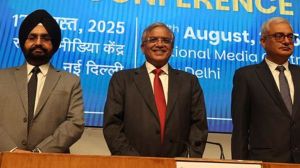Russians benefitted from UN oil-for-food programme: US Senate
Top Kremlin operatives and a flamboyant Russian politician reaped millions of dollars in profits under the UN oil-for-food program by sellin...

Top Kremlin operatives and a flamboyant Russian politician reaped millions of dollars in profits under the UN oil-for-food program by selling oil that Iraqi leader Saddam Hussein allowed them to buy at a deep discount, a Senate investigation has concluded.
The allegations—which also include descriptions of kickbacks paid to Saddam—are detailed in hundreds of pages of reports and documents made public on Sunday night by the Senate Permanent Subcommittee on Investigations in advance of a hearing Tuesday.
The documents outline a trail of oil and money that leads directly from Iraq to the Kremlin and the former chief of staff to Russian President Vladimir Putin and former president Boris Yeltsin. The report said Iraq sought to influence and reward the Russian government because it sits on the powerful UN Security Council that oversaw sanctions against the Saddam government.
A CIA report last year said Saddam granted top political leaders from around the world the opportunity to buy Iraqi oil at a discount. But the Senate report presents more detailed evidence, alleging Russian officials took up the offer and profited handsomely. In addition, the reports allege Russian politician Vladimir Zhirinovsky, several Russian entities and a Houston-based oil trading company, Bayoil, ‘‘paid millions of dollars in illegal, under-the-table surcharges to the Hussein regime in connection with these oil transactions’’.
US officials say Saddam used illicit proceeds from oil sales to buy weapons, among other things. ‘‘This is the way Saddam used the oil-for-food: To line his own pocket and curry political favor,’’ said Senator Norm Coleman, chairman of the investigations subcommittee that released the reports.
Iraq’s UN ambassador, Feisal Amin Istrabadi, said Russia was one of dozens of countries that took advantage of Iraq’s oil wealth. ‘‘There were certainly commercial and political interests involved, and Russia behaved like any other state in looking after itself,’’ he said.
Under the program, Iraq bypassed traditional oil traders, giving influential businessmen, politicians, dignitaries and terrorist groups the right to buy millions of barrels of oil, US investigators have said. These individuals would then sell their rights at a profit of 3 cents to 30 cents a barrel to oil traders supplying major refineries in the US, Europe and Asia. Saddam eventually started charging a kickback of 10 cents to 50 cents a barrel, which was deposited in secret bank accounts.
More than 30 per cent of Iraqi oil allocations ended up going to Russian officials, political parties and businessmen. One of the new Senate reports said Saddam granted oil allocations—the opportunity to buy discounted oil—to a group identified as the Russian Presidential Council, made up of advisers appointed by the Russian President to devise presidential policy, draft presidential decrees and coordinate policy among agencies.
Two people were listed as receiving allocations on the council’s behalf—Alexander Voloshin, the highly influential chief of staff to Putin and Yeltsin, who also headed the council; and Voloshin’s friend and confidant Sergey Issakov. The report said the pair hired companies to handle the transactions and estimated they made profits of almost $3 million total between 1999 and 2003.
Voloshin, known as one of the most powerful Kremlin officials, resigned in 2003 over a scandal involving Russian oil giant Yukos. Voloshin managed Putin’s first campaign and helped to create the pro-Kremlin Unity Party. The report said the party also received oil allocations, along with the country’s Ministry of Foreign Affairs, the Communist Party and the Liberal Democratic Party.
The Senate report said Issakov was deputy chairman of Vnukovo Airlines and traveled regularly to Iraq to re-establish airline service between Moscow and Baghdad. A second Senate report said Zhirinovsky, a former presidential candidate who espouses an ultranationalist agenda, received allocations that he cashed for profits of as much as $8.7 million between 1997 and 2002.
Senate investigators obtained letters signed by Zhirinovsky that discussed the oil allocations and documents from Iraq’s Oil Ministry that linked him and his political party, the Liberal Democratic Party, to the allocations.
Bayoil played a key role in a number of transactions, the report said. The company had conducted an ‘‘aggressive campaign’’ to buy Iraqi oil under the oil-for-food program, but its efforts were stymied by a Saddam policy forbidding direct contracting with US or British companies. —LAT-WP
‘Russia has no evidence of oil-for-food abuse’
MOSCOW: Russia has no evidence its citizens won oil rights worth millions of dollars from Saddam Hussein in return for their support in lifting UN sanctions against Iraq, a Deputy Foreign Minister was quoted as saying on Monday. Yuri Fedotov told Interfax that Russia, which opposed the US-led war against Iraq, considered a US Senate probe into corruption around the ‘‘oil-for-food’’ programme a politically-driven bid to discredit the UN.
According to the Senate, Saddam used a series of Shell companies to effectively buy Russian officials’ support for lifting sanctions against his country. ‘‘We have been given no documents that could prove or could show that Russian companies or individuals working within the ‘oil-for-food’ programme broke the law,’’ Interfax quoted Fedotov as saying.
‘‘The campaign, which is continuing around the oil-for-food programme is of a completely politicised nature and is being used for improper ends,’’ Fedotov said. ‘‘(It aims to) discredit the United Nations, and at the same time, those countries that cooperated in the framework of the oil-for-food programme, which was in fact set up under a US initiative.’’
The Senate-indicted ultra nationalist politician Vladimir Zhirinovsky said: ‘‘I did not sign a single contract, did not receive a single cent, my name features here only because I asked the Iraqi leadership to give Russia more oil. I lobbied for the interests of our companies, I asked for and will continue to ask for oil for our companies.’’ —Reuters





- 01
- 02
- 03
- 04
- 05


























